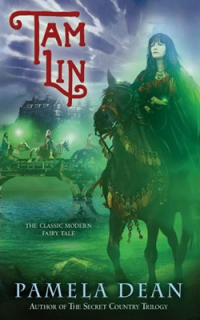This is one of my very favourite books, and one that grows on me with every re-read. But I know from other online discussions that it isn’t a book for everyone.
Tam Lin is based on an old Scottish ballad. It’s the story of a group of friends at a liberal arts college in Minnesota in the 1970s, talking, reading, discussing, seeing plays, falling in love, meeting the Queen of Elfland, coping with ghosts, worrying about contraception and being sacrificed to Hell.
That makes it sound much more direct than it is. The story, the ballad story, the way the head of the Classics Department is the Queen of Elfland, is buried in indirection. Many readers wake up to the fact that one of the main characters is about to be sacrificed to Hell as an unpleasant shock sometime in the last couple of chapters. It isn’t just a book you like better when you re-read it, it’s a book that you haven’t had the complete experience of reading unless you’ve read it twice. Some readers have even argued that Dean wanted to write a college story and pasted on the magic to make it sellable—sellable outside Jon’s mainstream ghetto, no doubt. If you hate indirection and re-reading, you’re probably not going to like it.
In fact the magic, the ghosts, the ballad story and the Queen of Elfland are integral to the whole thing. The central thing the book is doing is college as magic garden. The whole experience of going to university is magical, in a sense, is a time away from other time, a time that influences people’s whole lives but is and isn’t part of the real world. College is where you are, as Janet puts it, paid to read for four years. It’s also many people’s first experience of being away from home and of finding congenial friends. But it isn’t, and can’t be, your real life. It’s finite and bounded. It falls between childhood and adulthood. And it’s full of such fascinating and erudite people who can quote Shakespeare. Where did they come from? They certainly can’t have come from high school, and “Under the hill” is Tam Lin‘s very interesting answer.
The other thing some readers object to is the pacing. The first year takes up far more of the book than the subsequent years, and the climax is over with almost before you’ve had time to savour it. I didn’t understand this properly myself until I wrote a play version of the ballad—the pacing of the novel is the pacing of the ballad. It’s very impressive, and I kicked myself for not spotting it until I tried to do it myself.
Furthermore, you won’t like Tam Lin unless you like reading, because a lot of it is about the meta-experience of reading and thinking and putting things together. (There are plenty of books you can enjoy even if you don’t like reading. This just isn’t one of them.)
You may not like it if you didn’t feel the need to go to, or hated, university—you may find yourself passionately envious though. I mean, I was a Classics major myself, but not only did I never meet any magic people (so unfair!) but I was at a British university where I did nothing but Classics for three years, never mind all those fascinating “breadth” requirements. (Incidentally, I’ve known a couple of parents who have given this book to their teenage kids who are bored with high school and can’t see the point of more education. This works.)
One of the main reasons I re-read certain books over and over is to hang out with the characters. The characters in Tam Lin are so cool to hang out with that I sometimes wish they were with me when I go to see plays. If you don’t get on with them, then it isn’t going to work for you. Myself, I think they’re wonderfully real and three dimensional and fascinating.
Oh, and the last reason you might hate it—if you hate books that mention other books so that you wind up with a reading list of things the characters read at the end. Now I adore this, and not just with books. I found Rodin because Jubal Harshaw liked him, and Bach because Cassandra Mortmain liked him, and the Beatles because George Orr and some aliens liked them. Similarly, Tam Lin encouraged me to read Christopher Fry and Rosencrantz and Guildenstern Are Dead and Doctor Johnson. I hate it when books rely on knowledge of something external, when they lean on it as if everybody through all time knows who Cordelia is* and it’s enough to namedrop a reference to get automatic free atmosphere. In a book replete with references, Dean never does this. Even with Shakespeare she quotes enough and fills in enough that it doesn’t matter to understanding the story whether or not you knew it beforehand, without boring those who did know before.
It’s a fairly long book, but I’m always sorry when I get to the end and have to stop reading it.
Full disclosure: Pamela Dean is a friend of mine, I’ve beta read her latest book, and I’ve had her Tam Lin conducted tour of Carleton College. But if you think that makes any difference to what I think about the book, you should see all the friends I have whose books I keep meaning to get to sometime.
* Cordelia could mean Lear’s daughter, Miles Vorkosigan’s mother, or somebody in Buffy.










